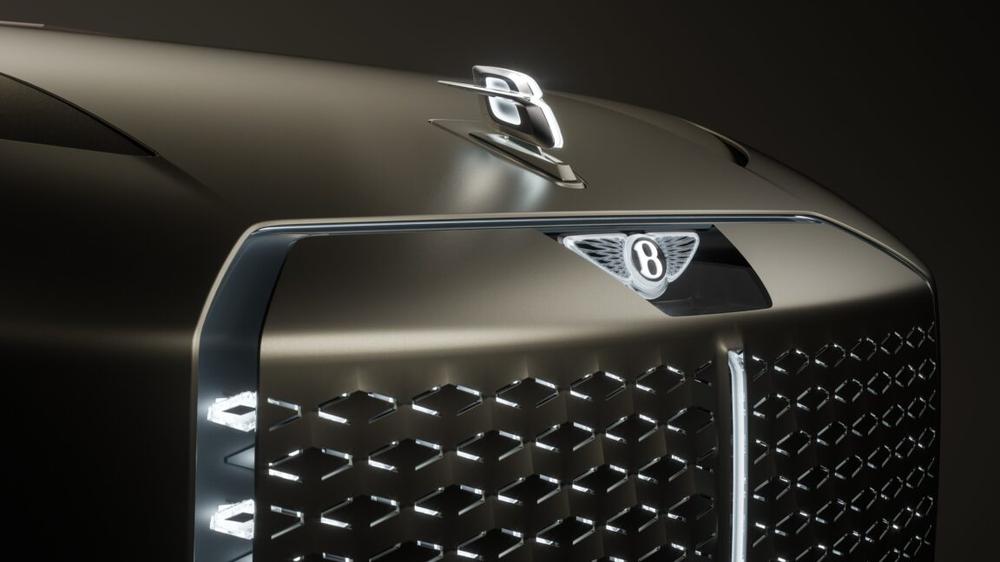If the Tesla Model S prodded the legacy car companies to get on top of battery production and introduce iPad-like screens in cars, Chinese car companies are bringing the heat for what's left of the 2020s in all segments. Much of the media coverage has rightly been on how this trend will affect mass-market vehicles. But what does it mean at the high end of the market?
"Well, the first question would be 'Are the Chinese manufacturers really competitive?'" said Bentley Chairman and CEO Dr. Frank-Steffen Walliser in an interview during Monterey Car Week. In the bucolic coastal setting, surrounded by the rarest of rare cars, the competition from the other side of the world appeared far off.
"I don't want to be arrogant, but having what is considered a car in the luxury segment needs more than just technology. It's honestly only Germany, Italy, and the UK. You need heritage, you need the craftsmanship behind, you need the storytelling and everything with it. That builds up an actual brand."
But is a story enough to stand the test of time for the early 20th-century icons Bentley, Rolls-Royce, and Maybach? China's whip-fast advances in tech and manufacturing are testing that theory. Chinese automakers are selling EV cars both domestically in China and in Europe.
"Chinese consumers at all price points are increasingly turning away from foreign brands to domestic alternatives that they view as just as good," said Vice President of Market Research at Telemetry Sam Abuelsamid. "The only exceptions are those that are focused on exclusivity, which they may only be able to get from the Europeans. The thing that sets Bentley or Rolls-Royce apart the most is the hand-built and often bespoke nature of the vehicles."
How do you compete with that?
But as Chinese consumers' tastes shift, European exclusivity might not be enough to stay on top. "Most customers aren't going for a bespoke version of these cars, and when comparing some of the Chinese brand offerings on an objective basis, it's increasingly difficult to make the case for European brands, even among the more volume brands like Porsche," Abuelsamid said.
Chinese manufacturers are embedding more digital bells and whistles that impact all segments of the market, and not just in China. "Just as in other segments, the Chinese OEMs are moving faster than anyone else on software, especially for infotainment, bringing big screens and digital assistants with homegrown software and lots of connectivity, but also on driving assist and automation," Abuelsamid said. "These vehicles are being equipped with lidar, radar, cameras, and point-to-point driving assist, similar to Tesla navigation on Autopilot."
The onslaught of features by Chinese competitors has luxury European automakers on their toes.
"Hongqi is probably the closest to a direct competitor in China and certainly has some offerings that might considered be in a similar class to Bentley," Abuelsamid said. "There are numerous other brands that continue to move upscale and will likely eventually reach a similar level, even if they aren't as hand-built as a Bentley, such as the BYD Yangwang U8 SUV."
For example, the Maextro S800, a premium car born out of Huawei and JA joint venture, crab-walks a 16-degree angle to make tight parking easy, features hand-off "level 3" partially automated driving, and charges from 10 to 80 percent in just 10.5 minutes, according to Inside EVs.
"We see it drives demand for features and what people expect their cars to have," Walliser said. "They say, 'Hey, if my $50,000 car has self-driving capabilities, why don't I have it in my $250,000 car?' So this is the real rival. It's a feature competition, and it raises expectations," Walliser said.
EXP 15
Bentley's latest concept, the EXP 15, hints at this next generation of predictive elements customers say they want. Clever UX design includes a rotating dashboard and illuminated forms on the dash, which are mixed with fine wools, leathers, and premium materials in the cabin. "I think we have to continue [to think] like that in self-driving capabilities. We do not have to be first in the market," Walliser said. "We need to plan when we offer it. It comes also for infotainment, for app connection, for everything that makes life in the car convenient, such as self-parking capabilities."
Dr. Matthias Rabe serves on Bentley's board of management and oversees Research and Development. He thinks the right approach to technology for Bentley is for the car to serve as a sort of virtual butler. "What I would like to have, for example, is that the customer drives to the front of the house, pops out, and the car parks itself, charges itself, and probably gets cleaned by itself," Rabe said.
The EXP 15 was on view at Monterey Car Week on the concept lawn at the Pebble Beach Concours d'Elegance, in contrast to Bentley showing off its current and historic lineup. I took a ride along the picturesque 17 Mile Drive in the EXP 15's spiritual inspiration, the stunning 1930 three-seater Bentley Speed Six Gurney Nutting Sportsman coupe that was nicknamed "Blue Train." Its elegant fixtures, precious timepieces, and bespoke surfaces convey its multi-million-dollar value.
Bentley is moving with caution and restraint rather than going too deep into touch screens and digital cockpits, but it can't ignore the shifts taking place. The current range borrows heavily from Audi's HMI setup.
How Bentley's next-generation cars fare depends on close attention to what its customers want and how it can edit its offerings down to new features that matter. Ask any modern car shopper—few are up on all the feature settings available in their car's advanced systems. And Bentley is no exception.
"We have thousands of functions in the car people have to be aware of," Walliser said. "The reality is, if you make a handover of such a car, people are just standing in front of it, they are totally overwhelmed. They look for color in the seat they're sitting in." The way Bentley customers shop is shifting, too, from in-person interactions to digital shopping tools like configurators that matter more than ever.
"A car configurator sounds easy, but this is super complex because it has to be linked with your factory and what you can build in colors and trim. These drive the business because if you keep your residual value, it's very easy to switch them to the next-generation car.
Where do we go from here?
The 2026 EV launch will be Bentley's first foray into an all-electric production car. Despite the US's shifting EV policies, Bentley says it's committed to multi-pronged electrification plans after launching the plug-in hybrid Flying Spur and, more recently, the Continental GT this spring. Walliser is confident that Bentley can best the Chinese competitors both in China and the global markets, doubling down on its history and efforts to preserve residual volume through low volume and desirability.
He points out that EV adoption in China isn't altogether straightforward. While China has shifted half of its cars to EV powertrains, Walliser says only 25 percent are purely electric. The rest are plug-in hybrids and range extenders. "The take rate in China is not so different to at least to Europe or in the UK," he said.
But as EV options expand and regulations shift, it's anyone's guess when this pace will accelerate, or even deaccelerate, across the world. "China will be quicker than Europe, and that will be again quicker than the US, but we do not know what that prediction is. To me, it's all about risk balancing; we cannot go just one or the other route," Walliser said.
Despite the reverence for classic collectibles at Pebble Beach, the race is on in all segments of the car market, including the top tier. "We're now making decisions for cars that will come to the market in three, four, five years. Once you decide the cadence, it has an impact over the next 10, even 15 years. You think, 'Are we making the right choice?'"
Much of that future is out of automakers' hands. For the US market, Chinese competition is not a current reality, and EV adoption has taken a hit due to shifts in US policy under the Trump administration.
"It's driven by the regulations. It is not driven by customer demand," Walliser said. "Mainly, it comes over time, and people see also the benefit of electric cars, but that transition will take way longer than it was originally said to be. It's not a five-year project. It's a 25-year project," he said. For a 100-plus year-old company, Bentley is in it for the long game.

 Call of Duty: Black Ops 6 and Warzone's Season 05 Reloaded Update Is Light on Goofy Cosmetics, Heavy on Nuketown Mannequin Skins
Call of Duty: Black Ops 6 and Warzone's Season 05 Reloaded Update Is Light on Goofy Cosmetics, Heavy on Nuketown Mannequin Skins